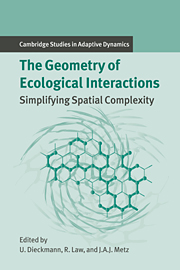Book contents
- Frontmatter
- Contents
- Contributing Authors
- 1 Introduction
- Part A Empirical and Statistical Background: A Plant Ecological Perspective
- Part B When the Mean-field Approximation Breaks Down
- Introduction to Part B
- 6 Grid-based Models as Tools for Ecological Research
- 7 Coexistence of Replicators in Prebiotic Evolution
- 8 Games on Grids
- 9 The Interplay between Reaction and Diffusion
- 10 Spirals and Spots: Novel Evolutionary Phenomena through Spatial Self-structuring
- 11 The Role of Space in Reducing Predator–Prey Cycles
- Part C Simplifying Spatial Complexity: Examples
- Part D Simplifying Spatial Complexity: Techniques
- References
- Index
- International Institute for Applied Systems Analysis
8 - Games on Grids
Published online by Cambridge University Press: 14 January 2010
- Frontmatter
- Contents
- Contributing Authors
- 1 Introduction
- Part A Empirical and Statistical Background: A Plant Ecological Perspective
- Part B When the Mean-field Approximation Breaks Down
- Introduction to Part B
- 6 Grid-based Models as Tools for Ecological Research
- 7 Coexistence of Replicators in Prebiotic Evolution
- 8 Games on Grids
- 9 The Interplay between Reaction and Diffusion
- 10 Spirals and Spots: Novel Evolutionary Phenomena through Spatial Self-structuring
- 11 The Role of Space in Reducing Predator–Prey Cycles
- Part C Simplifying Spatial Complexity: Examples
- Part D Simplifying Spatial Complexity: Techniques
- References
- Index
- International Institute for Applied Systems Analysis
Summary
Introduction
The theory of games and the theory of cellular automata seem at first glance to be totally unrelated (despite being created at about the same time – some 50 years ago – and boasting the same father, John von Neumann). In a recent and rather surprising development, the two disciplines have been brought together. The resulting spatial evolutionary game theory, which was first used to shed light on the emergence of cooperation, has grown rapidly during the past five years and has proved useful in other biological and economic contexts. In this survey chapter, we concentrate on the gametheoretical aspect, as the other contexts are well covered in other chapters of this volume. Thus, we stress mainly the effects spatial structures have on frequency-dependent selection.
Let us start with an arbitrary 2 × 2 game (Box 8.1), that is, a game between two players each having two strategies: (1) to cooperate (denoted by C) and (2) to defect (denoted by D). A player using C receives a payoff R (the reward) if the co-player uses C, and S (the sucker's payoff) if the co-player uses D. A player using D obtains the payoff T (the temptation) against a C-player, and P (the punishment) against a D-player. We interpret C as helping in a common enterprise and D as withholding help; therefore, we assume that the payoff R for two C-players is larger than the payoff P for two D-players.
- Type
- Chapter
- Information
- The Geometry of Ecological InteractionsSimplifying Spatial Complexity, pp. 135 - 150Publisher: Cambridge University PressPrint publication year: 2000
- 32
- Cited by

